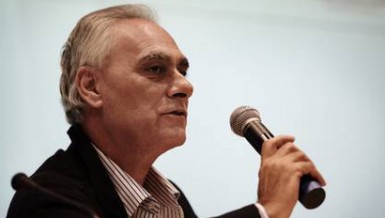
By James M. Dorsey
An Egyptian court has sentenced 12 militant football fans to five years in prison in an expansion of the military-backed regime’s crackdown on its Islamist and non-Islamists opponents that could ultimately re-position football as a major platform of protest.
The fans, members of Ultras Ahlawy, the well-organised and street battled-hardened militant support group of storied Cairo club Al-Ahly SC that played a key role in the popular uprising three years ago that toppled President Hosni Mubarak and subsequent anti-military protests, were sentenced in absentia for organising an illegal gathering and vandalism.
The convicted were accused of blocking a Cairo road to protest the arrest of Ultras Ahlawy members who clashed with police last October as they attempted to storm Cairo airport’s international terminal.
The verdict came days after just retired General Abdel Fattah Al-Sisi, the presidential candidate likely to win this month’s presidential election (who last year overthrew Egypt’s first and only democratically elected president, Mohamed Morsi, and has since directed a brutal crackdown on his opponents) defended Egypt’s recently adopted, draconian anti-Protest Law. The law is part of a regional trend visible in Saudi Arabia and Turkey as well as in debates in Jordan that equates protest with terrorism or categorises it as a precursor to political violence.
Speaking as part of his election campaign in his first ever, carefully choreographed television interview, Al-Sisi warned in a rare display of emotion that “we are talking about a country going to waste. People must realise this and support us. Whoever imagines otherwise, only wants to sabotage Egypt and this won’t be allowed. This chaos will bring it down, because of this irresponsible protesting,” he said. Al-Sisi warned that he would do “whatever it takes to restore security”.
An Egyptian court has sentenced to death this year more than 700 alleged supporters of Mr Morsi’s banned Muslim Brotherhood as part of a crackdown in which more than 3,000 people have been killed, some 17,000 wounded and 19,000 detained since last July’s coup.
The verdict against the fans and the brutal crackdown by security forces has shifted from their highly politicised founders to charismatic young men, who are often un- or under-employed and un-or under-educated. Their opposition to law enforcement has made their lives difficult not only in the stadia but also in the popular neighbourhoods of Egyptian cities.
“All the old people have left. There was a fight within the group. Some were kidnapped and held for three days. We were attacked with knives. People were injured. Their leader is enormously charismatic,” said a founder of one of the groups.
The former ultra who keeps close contact with militant fans said a recent fall in football protests fuelled by a ban on allowing supporters to attend football matches in a bid to prevent protests was in part due to a pledge by the interior minister to next seasons replace security forces in stadia with private security firms.
‘It’s likely to be the quiet before the storm. I don’t know a single person who will vote in the presidential election. Even my parents, simple people who are not Islamists, don’t believe in what is happening. People will lose faith in the military. They are losing faith in everything,” he said.
Few young people voted in a constitutional referendum in January that seemed to indicate that Al-Sisi could count on the support of just under 40% of the electorate, enough to allow him to emerge as the candidate with the single largest voting bloc. Some 98% of the approximately 38% of the electorate that cast their vote in the constitutional poll, voted in favour.
They did not include the tens of thousands of young men who joined the ranks of the ultras in the last four years of the Mubarak regime as the fans emerged as the foremost civic group that physically resisted the regime in almost weekly clashes with security forces in stadia during the football season. The clashes allowed them to vent pent-up frustration and anger against the security forces, who, as the repressive arm of the regime, were Egypt’s most hated institution. They’re raison d’etre was revenge and payback.
The power of these alienated young men became evident within months of the overthrow of Mubarak when members of the Ultras White Knights (UWK), the highly organised radical fan group of crowned Cairo club Zamalek SC, stormed Cairo International Stadium’s football pitch in the 90th minute of the first post-revolt game between and Egyptian and a Tunisian team, disrupting the match and destroying goal posts and everything else in their path. The group’s founders realised that they were losing control.
“These guys know the security forces are waiting for them to make a mistake. That’s why they refocused their attention on football and distanced themselves from the Salafists. I don’t know how long that will last. We could face something like Syria. Islamists will lead the next revolution. It will be an Islamic revolution, not a fight for the state,” the former ultra said.
James M. Dorsey is a Senior Fellow at the S. Rajaratnam School of International Studies (RSIS), Nanyang Technological University. He is also co-director of the University of Würzburg’s Institute for Fan Culture, and the author of The Turbulent World of Middle East Football blog and a forthcoming book with the same title.



